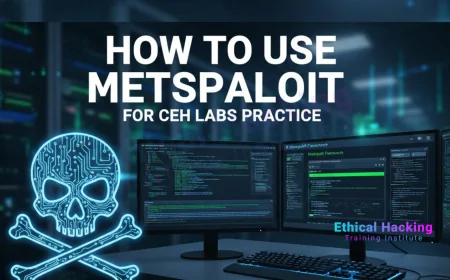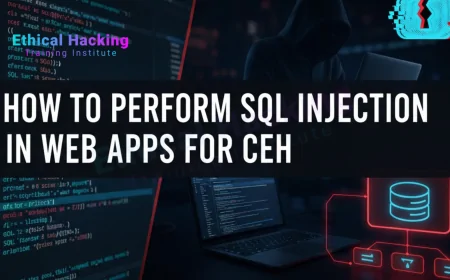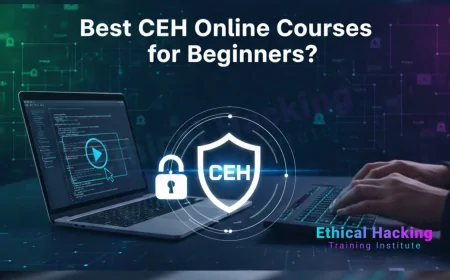How Ethical Hacking Services Can Protect Your Organization from Cyber Threats | Why Every Organization Needs Ethical Hacking Services to Prevent Cyber Attacks
Learn how ethical hacking services protect your organization from cyber threats. Explore types of tests, benefits, ROI, tools, and future trends in 2025.

Table of Contents
- Introduction
- What Are Ethical Hacking Services?
- Why Organizations Need Ethical Hacking
- Types of Ethical Hacking Services
- Benefits for Your Organization
- ROI and Cost Considerations
- Engagement Process Explained
- Techniques and Tools Used
- Compliance & Regulatory Impacts
- Choosing the Right Ethical Hacking Partner
- Best Practices for Engagements
- Future of Ethical Hacking Services
- Frequently Asked Questions
- Conclusion
Introduction
In an age of escalating cyber threats—from ransomware to supply-chain attacks—companies must be proactive in safeguarding digital assets. Ethical hacking services, conducted by certified professionals, effectively emulate attacker behavior in a controlled environment. By identifying vulnerabilities before they’re exploited, these services reduce risk, strengthen defense, and help organizations comply with regulations.This comprehensive guide examines ethical hacking services in detail, covering their formats, business value, toolkits, compliance relevance, and how to use them effectively..
What Are Ethical Hacking Services?
Ethical hacking services involve authorized, legal, and controlled security assessments performed by skilled professionals (white-hat hackers). These services simulate real-world attacks to uncover vulnerabilities in systems, networks, applications, and human factors. Unlike malicious hacking, these engagements follow predefined rules, ensuring no disruption to normal operations while maximizing learning.
Why Organizations Need Ethical Hacking
- Proactive defense: Finding weaknesses before criminals do minimizes breach potential.
- Reputation preservation: A single breach can lead to revenue loss and brand damage.
- Regulatory compliance: Standards like PCI-DSS, ISO 27001, GDPR require periodic security testing.
- Zero-trust adaptation: Ethical hacking supports zero-trust architecture validation.
- Improved incident response: Security teams learn root-cause analysis and mitigation strategies.
Types of Ethical Hacking Services
1. Penetration Testing
Simulates targeted cyber-attacks using manual and automated techniques.Pen-testing methodologies vary—black-box mimics an outsider, grey-box reflects a semi-informed attacker, and white-box simulates a trusted insider.
Ideal for infrastructure, network, or web apps.
2. Vulnerability Assessment
Comprehensive scanning of systems to detect known vulnerabilities. Prioritized reports with severity levels help teams remediate before attackers exploit them. Usually uses automated tools like Nessus, OpenVAS, Qualys.
3. Red Team Exercises
Full-scale simulated attacks targeting people, processes, and technology.These teams model the behavior of advanced threats that operate silently within systems for extended timelines. Often includes covert techniques like phishing, lateral movement, persistence, and exfiltration.
4. Social Engineering Testing
Tests human vulnerabilities via phishing, vishing, or physical access attempts. Helps measure staff awareness and assess effectiveness of training programs.
5. Application Security Reviews
Involves analyzing code, configurations, and design patterns to discover security flaws like SQL injection, XSS, CSRF. Includes static (SAST) and dynamic testing (DAST).
6. Cloud Security Audits
Examines cloud environments (AWS, Azure, GCP) for misconfigurations, identity mismanagement, and improper access control. Ensures compliance with CIS benchmarks and industry best practices.
Benefits for Your Organization
- Improved security posture: Identifies and fixes real issues.
- Risk reduction: Prevents financial and reputational damage from breaches.
- Audit readiness: Provides third-party attestations needed for compliance.
- Empowered teams: Dev squads, IT, and sec teams gain knowledge and hands-on labs.
- Funding and investment: Demonstrates risk management to stakeholders.
ROI and Cost Considerations
Ethical hacking involves direct costs—but yields measurable returns:
- Pentest: $4k–15k per engagement depending on scope.
- Vulnerability scan: $1k–5k annually.
- Red team: $25k–100k based on scale and duration.
- Social engineering: $2k–10k depending on simulations.
Compared to breach costs ($4M+ on average), ethical hacking is highly cost-effective.
Engagement Process Explained
- Scoping: Define target systems, attack methods, and rules of engagement.
- Reconnaissance: Information gathering via OSINT and network mapping.
- Discovery & exploitation: Identify weaknesses and exploit them safely.
- Post-exploitation: Lateral movement, data exfiltration tests, and cleanup.
- Reporting: Executive summary, technical findings, risk ratings, and remediation guidance.
- Retesting: Validate fixes in a follow-up engagement.
Techniques and Tools Used
- Recon: Nmap, Shodan, Amass.
- Exploitation: Metasploit, SQLmap, Burp Suite.
- Post-exploit: Mimikatz, BloodHound, Cobalt Strike.
- Phishing tests: GoPhish, King Phisher.
- Cloud: ScoutSuite, Prowler, CloudSploit.
- Reporting: Dradis, Serpico, Threat models.
Compliance & Regulatory Impacts
Ethical hacking supports compliance with:
- PCI-DSS (quarterly penetration testing)
- ISO 27001 (annual risk assessments)
- GDPR (demonstrable data protection)
- HIPAA, SOX, and other industry-specific mandates
Choosing the Right Ethical Hacking Partner
- Certifications: Look for CREST, OSCP, GPEN, OSCE credentials.
- Experience: Industry background, size of engagements, diversity of sectors.
- Approach: Custom vs cookie-cutter methodology.
- Reporting style: Executive summaries and actionable recommendations.
- Support: Post-test retesting, remediation help, and debriefing.
Best Practices for Engagements
- Define scope and rules clearly to avoid disruptions.
- Include IT, dev, and business teams in pre-test planning.
- Validate findings promptly with retesting.
- Invest in remediation before next audit cycle.
- Rotate test types regularly—quarterly scans with annual red teams.
Future of Ethical Hacking Services
- AI-powered testing: Adaptive attack simulations using machine learning.
- Continuous pentesting: DevSecOps integration with automated scanning.
- IoT/red-team hybrids: Tests incorporating smart devices and supply-chain risks.
- Cyber resilience services: Measuring preparedness for ransomware and disaster scenarios.
Frequently Asked Questions (FAQs)
1. What is ethical hacking?
Authorized simulations of cyber-attacks to identify vulnerabilities before real attackers do.
2. How is it different from penetration testing?
Pen-testing is one type of ethical hacking focused on systems—ethical hacking also includes social engineering, physical testing, red teams.
3. How often should my organization test?
Generally, quarterly vulnerability scans and annual penetration/red-team exercises are recommended.
4. How much does ethical hacking cost?
Small pen-tests start at $4k; red-team can go up to $100k depending on scope.
5. Is it safe to allow ethical hackers inside my systems?
Yes—professionals follow strict rules and back out safely after testing and remediation.
6. Will hacking slow down our operations?
Only if scoped poorly. Good engagements are designed to be low-disruption.
7. Does this help with compliance?
Yes—meets PCI-DSS, ISO 27001, GDPR, HIPAA, and other regulatory requirements.
8. Can ethical hacking uncover all threats?
No—it's part of a defense strategy; ongoing monitoring and patching are also essential.
9. What's a red team?
An adversarial group simulating real attacker behavior, including physical and social entry.
10. Do I need to prepare my team?
Yes—brief staff on what to expect, scope, and how to respond during testing.
11. What tools do ethical hackers use?
Nmap, Metasploit, Burp Suite, OWASP, cloud tools, and phishing frameworks.
12. Are automated scans sufficient?
No—automated tools find low-hanging fruit; manual testing uncovers complex threats.
13. Can we run tests ourselves?
Yes if you have skill and separation—but third-party tests offer fresh perspective and compliance credentials.
14. How do we validate fixes?
Retesting finds whether vulnerabilities remain—and verifies the scope of remediation.
15. Does this help mature our security team?
Absolutely—teams learn from engagements and strengthen detection or response processes.
16. What industries benefit most?
Finance, healthcare, government, manufacturing—any regulated or online-dependent sector.
17. Can ethical hacking help during development?
Yes—DevSecOps pipelines integrate tests early in the software development lifecycle.
18. Are findings confidential?
Yes—engagements are always under NDA, and findings are for internal use only.
19. What if an exploit fails during testing?
Ethical hackers report it; they don't force system changes—only verify what they can legally access.
20. What's next after testing?
Implement fixes, retest, update policies, train staff, and plan the next cycle of continuous defense.
Conclusion
Ethical hacking services are not optional extras—they are essential defenses in modern cybersecurity strategy. From uncovering hidden weaknesses to improving compliance and building trust, these services deliver real-world benefits and strong ROI. Choosing the right type of testing and trusted provider empowers your organization to stay ahead of threats and protect its most critical assets. In 2025 and beyond, ethical hacking will remain a foundational pillar for resilient cyber defense.
What's Your Reaction?
 Like
0
Like
0
 Dislike
0
Dislike
0
 Love
0
Love
0
 Funny
0
Funny
0
 Angry
0
Angry
0
 Sad
0
Sad
0
 Wow
0
Wow
0


















